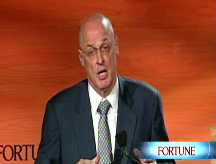Obama: I'll help cash-strapped states
The nation's governors make their case to the president-elect for federal money to stem the economic downturn. Experts say the sooner aid is given, the better.
NEW YORK (CNNMoney.com) -- President-elect Barack Obama on Tuesday told governors from across the country that he wanted them to work with him to "help design" a massive economic recovery package he hopes to sign shortly after he takes office.
"If we're listening to our governors, we'll not only be doing what's right for our states, we'll be doing what's right for our country," Obama said in remarks to a meeting of the National Governors' Association (NGA) in Philadelphia. "That's how we'll grow our economy -- from the bottom-up."
Plagued by rising unemployment, falling tax revenue and increased demand for social services, the governors in a closed door meeting shared with Obama and Vice President-elect Joe Biden their suggestions about the kinds of stimulus needed to jumpstart the economy in both the short- and long-term.
All told, 41 states are facing budget shortfalls this year or next, Obama said. The NGA estimates that states are facing an estimated shortfall of between $140 billion and $180 billion over the next two fiscal years.
The NGA and the National Conference of State Legislatures urged lawmakers on Monday to provide aid as soon as possible in three areas:
- infrastructure projects to create jobs;
- safety net programs such as Medicaid and food stamps; and
- efforts to offset state budget cuts by increasing the federal share for federal-state programs such as special education.
Most states are required by law to maintain balanced budgets, governors and lawmakers must make up for their budget shortfalls by raising taxes and cutting spending.
Speedy and well-allocated federal aid can make states' belt-tightening less painful, and in the process, keep the recession from getting worse, economists say.
One thing the governors didn't offer Tuesday were dollar figures for how much federal money they thought they would need to ease strains on their social programs and to help citizens directly, said NGA Chair and Pennsylvania Governor Ed Rendell during a press conference after the closed-door meeting.
But he stressed that governors recognize that states themselves have to do serious belt-tightening in conjunction with any aid they receive.
Beyond addressing their fiscal shortfalls, states are looking for help to fund infrastructure projects. The governors' association estimates there is roughly $136 billion worth of so-called "ready to go" projects that could be up and running within a year and a half, if not in a few months.
The best targets for short-term help are repair work on airports, bridges, highways, transit systems, ports, rails, clean water systems, sewers and broadband, Rendell said on Monday in a conference call with reporters.
"It's a matter of public safety, quality of life and economic competitiveness," said Rendell, a Democrat.
On Tuesday Rendell noted that in order for federal aid to be used most effectively, "we want to find a way to make sure those resources are handed out based on merit, not politics ... [and] it has to be fast ... so we have to find ways to eliminate state and federal bureaucratic hurdles."
Not every governor is certain direct federal aid is the best idea for states. Republican South Carolina Gov. Mark Sanford told reporters he questions whether we can "solve a problem that was created by too much debt with yet more debt." In the meeting, he said he suggested some of the best economic stimulus comes in the form of a stable dollar, open trade and "entrepreneurs working on a dream."
Rendell said that Obama in response to Sanford's comments agreed open trade is needed and "agreed with him that we have to do something about debt ... but President-elect Obama also noted the near unanimity of economists across the political spectrum that concerns about debt and deflation are secondary" until the economy is put back on track.
The governors' meeting took place just one day after National Bureau of Economic Research announced what economists have long suspected: that the U.S. economy has been in a recession for the past year.
While Obama made clear he was ready to offer aid to states, he also acknowledged that the federal government is already committing enormous sums to fight the financial crisis. "We're not as a nation going to keep being able to print money," he said.
"Make no mistake: these are difficult times, and we're going to have to make hard choices in the months ahead," Obama said. "I won't stand here and tell you that you'll like all the decisions I make. You probably won't."
But he did promise to seek their counsel in making those decisions and to listen to them "especially when we disagree." ![]()





